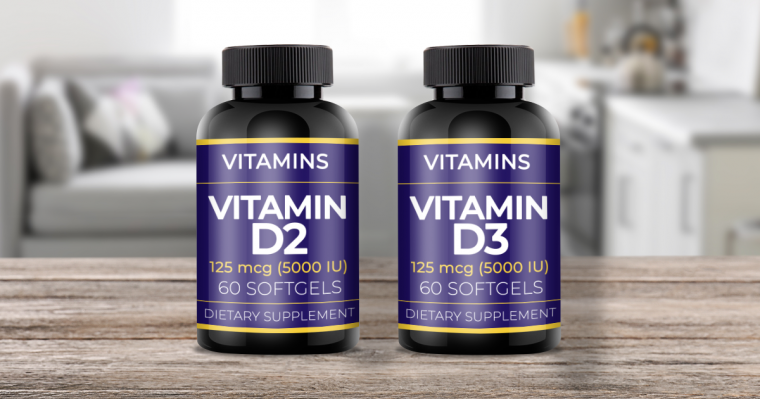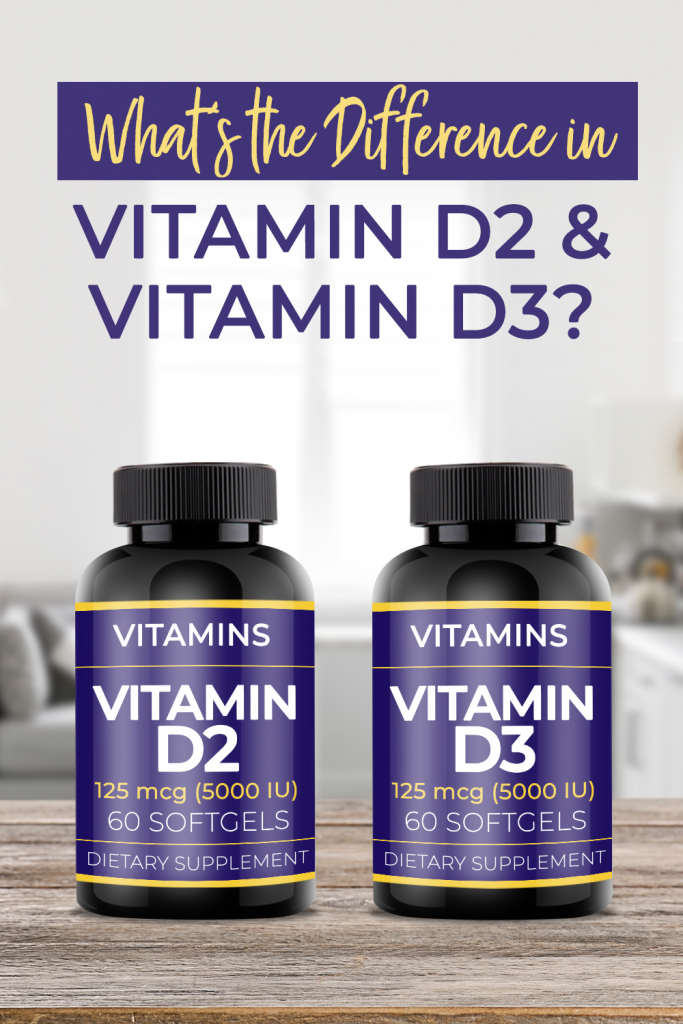
What’s the Difference in Vitamin D2 and Vitamin D3?
May 19, 2021When browsing the shelves for a vitamin D supplement, individuals may come across a few different options. Some supplements list ‘Vitamin D3’, some list ‘Vitamin D2’, and some just say ‘Vitamin D.’ So what’s the difference and what should we choose?
The Difference in Vitamin D2 and Vitamin D3
The first thing to know is that vitamin D3 and D2 also go by different names. Vitamin D3 is known as cholecalciferol, and vitamin D2 is known as ergocalciferol. Therefore, if a supplement just says ‘Vitamin D’ on the front, look on the back of the label to determine which form of vitamin D that supplement contains.
The next major difference is that vitamin D3 is generally synthesized in the skin during sun exposure in humans, and is also present in oily or fatty fish and cod liver oil. Vitamin D3 supplements are generally thought of as being obtained from animal sources, whereas vitamin D2 is obtained from plant sources. Vitamin D2 has typically been commercially produced from UV irradiated yeast and may also be present in mushrooms that have been exposed to UV light (https://www.nap.edu/read/13050/chapter/9#468).
In the body, there are several different forms of vitamin D. When the body receives vitamin D, either from food, supplements, or sunlight, it is inactive and must be converted several times until it is in a form the body can use. The first reaction that occurs in the liver converts vitamin D to 25-hydroxyvitamin D [25(OH)D], also known as calcidiol, and the second reaction that occurs in the kidneys converts that into 1,25-dihydroxy vitamin D [1,25(OH)2D], also known as calcitriol. Calcitriol is the biologically active form of vitamin D in the body.
When checking blood levels of vitamin D, typically doctors check the 25(OH)D, or calcidiol, level because that form has a longer half-life (meaning it sticks around in the blood stream longer) than the biologically active 1,25(OH)2D, or calcitriol, level.
Therefore, calcidiol is a better measure of vitamin D status in the body. There is some debate over the optimal levels of vitamin D in the body, but most researchers agree that anything less than 30 nmol/L is considered insufficient or deficient, and above 50 nmol/L is considered to be optimal for bone and overall health.
The Functions of Vitamin D2 and Vitamin D3
There are also several different functions of vitamin D. The most well-known function is that vitamin D aids in the absorption of calcium in the intestines and helps to maintain bone health. However, vitamin D also plays a role in inflammation, cell growth, and immune function. Actually, the term “vitamin D” is somewhat of a misnomer because vitamin D is synthesized from cholesterol and functions more like a prohormone than a typical vitamin.
So, when supplementing with vitamin D – either vitamin D2 or D3 – does it matter which one we choose?
Research shows that when taking supplements, both forms are absorbed by the body in the intestines equally well. Although, taking vitamin D supplements concurrently with a source of fat maximizes absorption since vitamin D is considered one of the fat-soluble vitamins. It has previously been thought that vitamin D3 is the superior form of vitamin D supplement because prior research showed that D2 supplements increased destruction of vitamin D, suggesting that form increased the risk for the individual to become deficient. However, more recent research has disproven that, especially when vitamin D is taken chronically versus given in a single dose. Studies have shown that vitamin D2 was converted to calcitriol in the body as efficiently as vitamin D3 (https://www.nap.edu/read/13050/chapter/9#468).
When looking for higher doses of vitamin D from supplements, vitamin D2 is the only form available as a pharmaceutical in the 50,000 IU dose. This is because 50,000 IU vitamin D2 predated the FDA and was grandfathered in, whereas vitamin D3 was never evaluated as a pharmaceutical (https://www.nap.edu/read/13050/chapter/9#468).
When choosing over-the-counter supplements, it is important to remember they are not all created equal. Supplements typically do not require FDA approval before the production and marketing of that product. Therefore, choosing supplements that have been third-party tested by organizations such as USP (United States Pharmacopeia) or NSF (National Science Foundation), tend to be more reliable. It is also important to consider the source or company selling the products.
There are many cheaper and fraudulent supplements available through online retailers now than ever before. So purchasing supplements directly from the company (certified by third-party testing) or from a pharmacy is generally considered more safe and reliable.
Ultimately, when it comes down to the appropriate choice for you, choose the supplement that has been proven safe and effective. If you choose to follow a vegan diet, you will probably want to consider choosing vitamin D2 supplements since those are produced without animal products. If you have additional questions regarding dose and/or length of use, it is advised that you consult with your doctor, pharmacist, and/or registered dietitian.

 | ABOUT THE AUTHOR Michelle Bauche, MS, RDN, LD, CSOWM is a registered dietitian working for Missouri Bariatric Services in Columbia, Missouri. She is a certified specialist in Obesity and Weight Management and a member of the Weight Management Dietetic Practice Group through the Academy of Nutrition and Dietetics. Read more articles by Michelle! |



